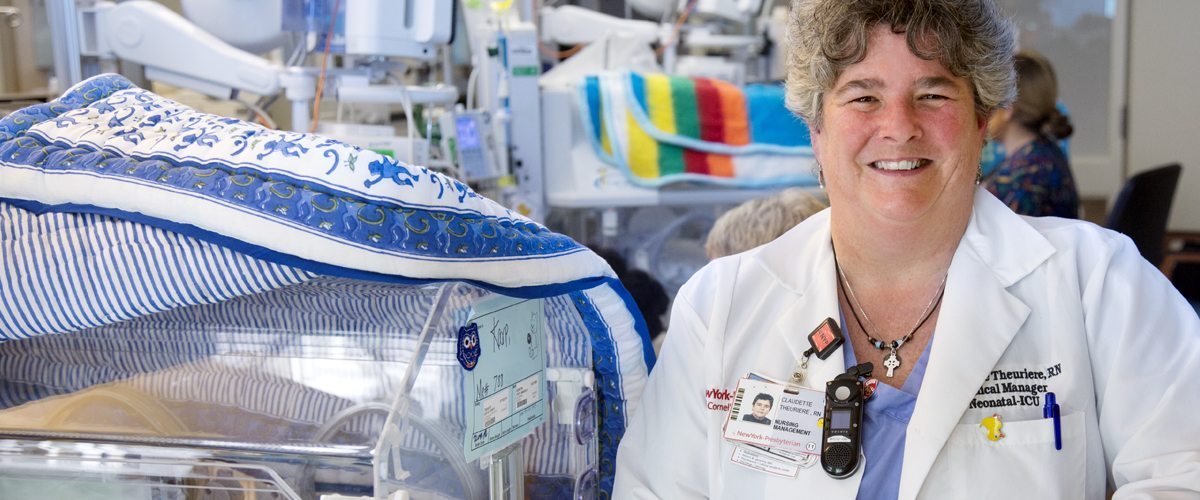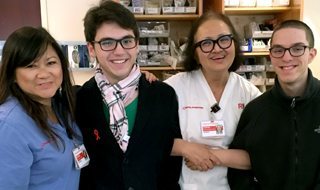Beyond the Bandage: Claudette Theuriere
A nurse provides critical care for those most in need.

Claudette Theuriere was 23 years old and fresh out of nursing school when she landed her dream job: working in the neonatal intensive care unit at NewYork-Presbyterian/Weill Cornell Medical Center. “I always wanted to care for the most critical babies,” she says.
As a new staff nurse assigned to the evening shift, Theuriere recalls how her fellow nurses taught her to care for the hospital’s tiniest patients. “We were a very busy unit — busier than most shifts,” she says. “You had to be a quick learner. Thankfully, I worked with the same nurses every day. That consistency and teamwork was a lifesaver in the beginning.”
It didn’t take long, though, for Theuriere to feel at home in the NICU. “At a certain point, it just becomes a part of you,” she says. “In the NICU, you admit the baby, you care for the baby for X number of months, and then the baby goes home from here, so with every step, you get to see the baby progress and get better.”
Seeing those improvements — those small yet crucial changes in a baby’s first weeks and months — motivates her to this day. “I was lucky enough to find what I love,” says Theuriere.
Now a clinical manager responsible for overseeing the NICU where she got her start 35 years ago, Theuriere says that despite the heartbreak of losing patients, she allows herself to bond with the babies and their families. She considers it part of the job.
Two babies in particular have been a part of her life ever since they came into this world.
Harrison and Chandler (Chad) Dillingham were born in September 1999, both premature. Harrison, weighing under 1 pound, was significantly smaller than his brother.
Harrison had virtually no Apgar score — a measurement that indicates a baby’s condition right after birth. The delivery team was skeptical he would survive, but Tracy Berran, one of the neonatal nurse practitioners who helped deliver him, wouldn’t give up, doing everything she could to keep him alive. Nurses suggested using the “kangaroo method”— skin-to-skin contact with the mother, which seemed to help. Meanwhile, Chad, who was bigger at 2 pounds, 12 ounces, was placed in an incubator near his brother. Eventually, Harrison started to respond to treatment and grow stronger.
“A lot of what we do in the beginning for these little babies is keep them warm, keep them breathing and get them whatever treatment they need — whether it’s fluids, antibiotics,” Theuriere says. “They call it the golden hour in neonatology — getting these things to babies as quickly as you can to keep them alive.”
I was lucky enough to find what I love.
Claudette Theuriere
Chad was able to go home after 6 ½ weeks; Harrison spent the next 4 ½ months in the NICU. His mother, Deb, visited him every day during lunchtime and again after work, until around 11 p.m. She spent most weekends there as well for several hours each day.
Those days were exhausting and scary. It was during that time sitting in a rocking chair that she grew close to the nurses, especially Theuriere.
“I got to know a lot of the nurses. They would always spend time with me. I remember Claudette was always very calm. She would come around every day, ask how I was doing and then just listen to my concerns, my worries. She was such a good listener.”
Deb remembers coming into the NICU to find blankets and stuffed animals nestled in the isolettes and holiday decorations adorning the stations. “It was the most nurturing environment,” she says. “They made it a home. These nurses are caring for your child, day in and day out. It’s their direct care that was so incredible — beyond what you could ever imagine. I truly believe my children would not be here, if not for the nurses.”
Theuriere remembers those days clearly. “Harrison had a long road ahead of him because he was so small,” she says. “He had several challenges along the way, but he was a fighter.”
Seeing Theuriere every day, Deb and her husband felt a special connection with her.
Just after the start of the New Year, it was Harrison’s turn to go home. When babies leave the NICU, it can be bittersweet for the nurses. “You’re really happy to see that they’re strong enough to go home, but you’re sad you won’t get to see them every day,” Theuriere says.
Instead of drifting apart, the bond between Theuriere and the Dillingham family grew stronger. Theuriere joined family get-togethers and spent several Christmases at their home.
In 2002, Deb gave birth to Abigail. Soon after, she asked Theuriere to be Abigail’s godmother. “There really was no other choice,” Deb says. “Claudette had become so important in our lives.”

Harrison and Chad revisit the NICU
Today, Theuriere helps facilitate the family’s annual Christmas visit to the NICU. Every Christmas Day, they bring teddy bears and handmade cards for all the babies’ parents in the NICU. The family goes room to room, a tradition that began when the twins were babies.
“We do this so our children will never forget how important the NICU nurses were to our family as well as to all of the other families,” Deb says. “It’s a way to ultimately thank the nurses and bring hope to the families who are there in the hospital during the holidays.
The twins are now 17 and applying to colleges. Both have written about their annual NICU visits in their college essays. Deb recalls, “The nurses were there for us when we needed support, and it is important to us to never forget the incredible team that helped our family.”
Although the boys will be in college soon, Theuriere doesn’t worry about visiting them. She knows she’ll see them next Christmas.
Claudette Theuriere is the clinical manager of the neonatal intensive care unit at The Komansky Center for Children’s Health at NewYork-Presbyterian/Weill Cornell Medical Center.

